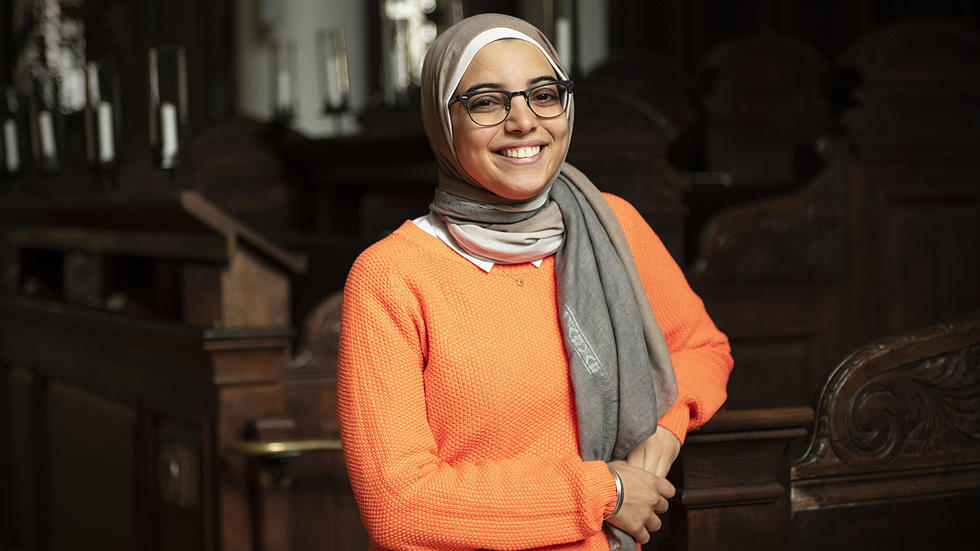 Morning Prayers address by Anwar Omeish ’19, October 18, 2018 in the Memorial Church. Photo by Jeffrey Blackwell/Memorial Church Communications
Morning Prayers address by Anwar Omeish ’19, October 18, 2018 in the Memorial Church. Photo by Jeffrey Blackwell/Memorial Church Communications
--
--
And their Lord responded to them, "Never will I allow to be lost the work of [any] worker among you, whether male or female; you are of one another. So those who emigrated or were evicted from their homes or were harmed in My cause or fought or were killed — I will surely remove from them their misdeeds, and I will surely admit them to gardens beneath which rivers flow as reward from Allah, and Allah has with Him the best reward." The Quran.
Last winter, when I went home for break, I took a class at my mosque. Several minutes in, my mother noticed a woman staring at me. After a while, we dismissed it as a strange occurrence and moved on.
Later that day, the woman approached my mother and apologized for staring. Your daughter, she said, looks just like mine. I have not seen her since my son and I left Istanbul — we are refugees from Syria, you see, and I was unable to secure a visa for her alongside us. When I saw your daughter, it seemed, for a second, like mine was here, too.
My mosque at home is called the home of migration, and its air is thick with stories like that one. It was established for those of us who found ourselves here after journeys across the sea, leaving homelands and heartlands bleeding with desperation. Named after the Prophet’s migration, too, fleeing other, older oppressions, it marked dusty, well-traveled trails:
Trails of refugees fleeing drought, fleeing famine, fleeing manufactured wars.
Trails of young men caught in war on terror dragnets, their families traveling miles to be turned away at prison gates, their first steps after decades, returned to the home of migration.
Trails of dissidents, of gunshots parting seas of protestors before your very eyes, leaving homes that no longer want you back.
At my mosque, we have all of these stories. We hold them, telling ourselves that if we breathe fast enough, they may clear in this new American air. And we pray, above all, that these migrations mean something — that our journeys are not in vain, that the audience can and will understand the narratives of our lives.
Jamal Khashoggi was one of those mosque goers. Like others in our northern Virginia suburb, he yearned for a homeland he had been forced to migrate from. Put miles in between himself and his place of birth. Tried to make meaning of that distance, translate migration into change.
But for Amu Jamal, it wasn’t, in the end, his migration here that mattered. It wasn’t the columns he wrote or the speeches he gave. In the end, his journey away from us, into the next life, drew the biggest audience. Was the most important migration.
What does it say about Muslim pain that only its dismemberment, only its careful dissection and presentation to church congregants, makes it appear whole?
I wonder, if that woman’s daughter told her story, would anyone listen?
Amu Jamal has migrated to his lord, but we are still here. Still telling the stories of our migrations, of crossing borders and prison bars and dictatorship lines. And even as sometimes, I think there is no audience to this pain, here I am, migrating this story from one house of God to another. Asking you to be a house of migration in your own self, of hearing and crossing stories while they are still living.
The woman I met last winter saw her daughter in me, even with migrations between us.
“I wonder, if you heard these stories, you would see yourself in them, too. Our hands are raised to You, our palms are open wide:
We seek sincerely endless grace that You do provide.
Be gentle with our souls in all You have decreed,
Bestow on us what pleases You in what we need.
Replace our state of hardship with Your gentle ease,
And guide us with Your power’s prevailing breeze,
And place our status over those who took our lands,
Constrain their evil now, and tightly bind their hands;
Overcome our foes with Your subduing might,
Unravel all their hopes, and force them to take flight; Deter their evil aims, and dash their unjust plan;
Repel them from our gates, and mystify each man.
Be swift in justice, Lord, in this our anxious hour,
For they cannot remove an atom of Your power.”
— Muhammad ibn Nasir
